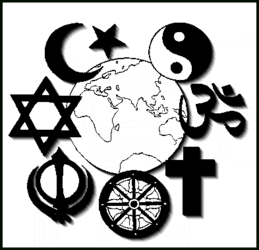In this project looking at the intersection of food and religion in Burlington, we set out to understand the social and personal difficulties that followers of various faiths might face in maintaining their chosen food ways. We were able to explore some of the realities of foodways through our research, especially focusing on the practices of UVM students and Burlington-area residents.
Islam
Making Mujadara
Due to the fact that there are not necessarily explicit halal recipes, I chose to make a dish that is commonly eaten during Ramadan, the ninth month in the Islamic calendar.
This month-long holiday is very relevant to Muslim food practices because during this time observers fast from sunrise to sundown but eat their meals during the hours of darkness with family or the local community. Followers of Islam believe that this holiday teaches Muslims patience and modesty.
The meal served before dawn is called the suhoor and the meal served after dusk is known as the iftar. Before the iftar, Muslims break their fast by eating dates.
One such meal that may be consumed is majadarra, a rice, lentil and onion dish that is common in the Arab world, which is what I chose to make in my investigation of Islamic food practices. This dish is fairly simple to make and most of the ingredients are easy to come by.
Halal and Haram
Image credit: spicyjackdeli.com
Islamic law separates food into two categories: clean and lawful (halal) or unclean and unlawful (haram). Halal and haram are terms that exist outside the sphere of food as well for example they are also applicable to earning a living, dress code, and interactions with others. Another third category known as mashbooh or mustabahat describes foods that are questionable or doubtful. These distinctions come from the Quran and other religious doctrines based on what the Prophet Muhammad reportedly said and did.
There are strict rules surrounding halal foods, concerning what Muslims can and cannot eat. The reasons for prohibition are mainly impurity and harmfulness. The adherence to these food laws for followers of Islam is a matter of obeying God. The foods that are explicitly forbidden include animals that die themselves, blood, swine and carnivorous animals, as stated in the following excerpt:
“Forbidden to you (for food) are: dead meat, blood, the flesh of swine…” (Surah al-Ma’idah, V: 53)
Fasting is another way in which Muslims can earn the approval of Allah. Muslims ritually fast on certain days and during certain months, such as the ninth month of the Muslim calendar, Ramadan. It is also a way to control appetite since excessive consumption is considered a sin.
All intoxicants are also considered haram, specifically alcohol. Many Muslims will not eat foods containing vanilla extract or soy sauce because these products contain alcohol and also do not eat foods cooked with alcohol.
In addition to these forbidden foods, other rules dictate the methods by which the meat can be slaughtered. The focus is on gentle and humane practices. An animal must be slaughtered by a Muslim, while simultaneously mentioning the name of God or Allah, and this meat is then called zabiha or dhabiha meat. For example, the Quran states:
“O ye who believe! Eat of the good things wherewith We have provided you, and render thanks to Allah, if it is (indeed) He whom you worship. (Chapter II, Verse 172)
In non-Islamic countries these food rules would obviously be difficult to adhere to, and concerns of cross-contamination are often an issue. For example, foods like gelatin in fact contain pork products although it is seemingly meat-free. However, halal markets are popping up worldwide. Especially in major cities there are many food trucks and carts serving primarily halal foods. Organizations exist which can certify these markets and companies to accommodate growing Muslim populations in North America and Europe.
VPR reports that there are more than 2,000 Muslims living in Vermont. Here in Burlington are two businesses that provide halal foods: Community Halal Store and Global Markets, which used to be Halal Vermont. These are some of the only providers of certified halal foods around, especially meats.
Riaz, Mian N., and Muhammad M. Chaudry. Halal Food Production. Boca Raton, FL: CRC, 2004. Print.
“VPR: Vermont’s Muslims.” VPR: Vermont’s Muslims. N.p., n.d. Web. 22 Oct. 2013.
INTRODUCTION
On Thursday, September 26, Professor Paul Kindstedt spoke to University of Vermont students and the Burlington community in “Cheese and God: How Spirituality and Religion Shaped the History of Cheese”. While at first glance these subjects seem to be two divergent interests, in actuality, Professor Kindstedt’s talk proved they are intricately connected, shedding light on the undeniable connection between food and religion.
On an everyday basis for many members of the UVM and Burlington communities, a balance between food needs and religious beliefs is a fundamental lifestyle choice. This blog, Foodie Faith, was created by four UVM Anthropology students to explore these food experiences, from celebrations to challenges.


